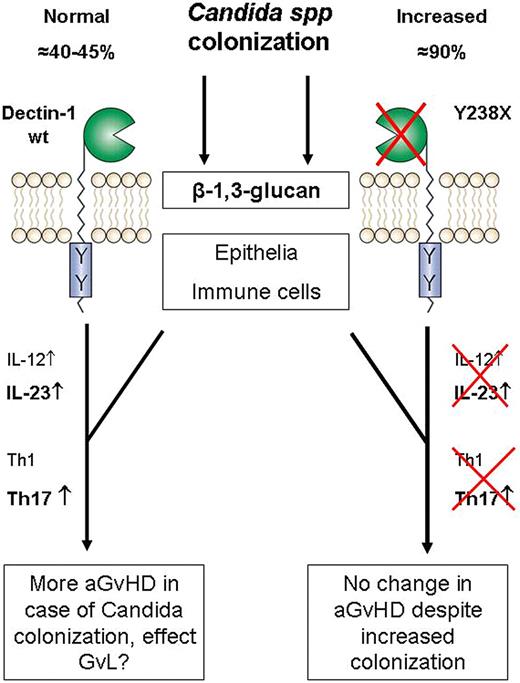Abstract
Abstract 4498
Dectin-1 is a C-type lectin receptor that recognizes b-1,3-glucan, and plays an important role in antifungal immunity. The recently discovered dectin-1 Y238X polymorphism, which results in “loss-of-function” has been shown associated with increased Candida colonization of stem cell transplantation (SCT) recipients. Besides its role in antifungal immunity Dectin-1 exhibits a broader function in immunity. Stimulation of Dectin-1 with β-glucan affects antigen presentation, modulates T-lymphocytic (CD4+, both Th1 and Th17, and CD8+) and B-lymphocytic responses, and induces cytokine production including interleukin (IL) 10, IL-12 and IL-23. These specific T-cell responses and cytokines are of particular interest in SCT because they are involved in graft-versus-leukemia (GvL) effects as well as in the pathogenesis of graft-versus-host disease (GvHD). Therefore we now performed a retrospective study in 140 patients on the impact of the Y238X polymorphism on the outcome of myeloablative T cell-depleted matched related SCT. The allele frequency of the Y238X polymorphism was 6.6%, with 10.7% of patients and 15.7% of donors bearing the polymorphism. All were heterozygous and at least one polymorphism was present in 28 of 140 (20%) patient-donor pairs. We found no impact of the polymorphism on the occurrence of acute and chronic GvHD, non-relapse and relapse related mortality, nor disease-free and overall survival. Interestingly, patients from patient-donor pairs bearing the wild-type allele who were colonized with Candida had an increased incidence of acute GvHD compared to non-colonized patients (41.9% vs. 20.4%, OR=2.6 95%CI:1.02-6.58, P=0.04). However, this seemed to be the other way round for patients from pairs with the Y238X polymorphism (23.5% colonized vs. 30% not colonized, OR=0.7, ns). Therefore we hypothesize that the loss-of-function of dectin-1 increases colonization through deficient mucosal immunity, but prevents inflammatory complications resulting from colonization (Figure 1). This might explain the lack of an effect of the Dectin-1 Y238X polymorphism on outcome measures of SCT.
Simplified hypothesis on the role of dectin-1, polymorphism Y238X, and Candida colonization on acute GvHD and possibly GvL.
Simplified hypothesis on the role of dectin-1, polymorphism Y238X, and Candida colonization on acute GvHD and possibly GvL.
In case of Candida colonization (left) activation of the dectin-1 receptor influences immune responses and allo-reactivity increasing the incidence of acute GvHD. In the presence of the loss-of-function polymorphism Y238X (right), although Candida colonization is increased, due to the loss-of-function of dectin-1, no changes in the allo-reactive T-cell responses occur.
No relevant conflicts of interest to declare.
Author notes
Asterisk with author names denotes non-ASH members.


